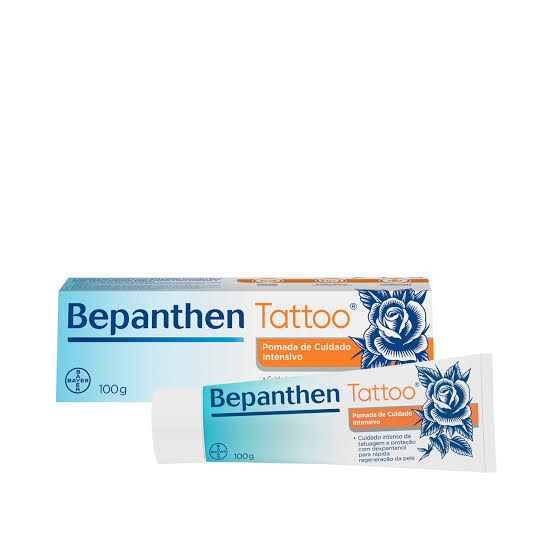Why is bepanthen not used on Tattoo: Welcome back to fashionbeast.com.ng
If you are into tattoos, you might have heard conflicting opinions about whether or not Bepanthen is the right choice for tattoo aftercare.
Let’s look into it together then.
Check out Is Bepanthen Safe to Use on Tattoo? 2024
What is Bepanthen?

Wait, what exactly is Bepanthen?
Many of us might know it as a popular ointment used for nappy rash in babies.
It contains dexpanthenol, which is a form of vitamin B5, known for its moisturizing and skin-healing properties.
So, why wouldn’t we want to use it on our tattoos, especially when it seems to promise such skin-loving benefits?
Check out Less Sensitive Body Part For Tattoos 2024
The truth is, Bepanthen might work wonders for diaper rash and some minor skin irritations, it’s generally not the best choice for tattoo aftercare.
But, why is bepanthen not the perfect choice for tattoo aftercare?
Now, let’s check out some reasons why bepanthen is not used on Tattoo.
Read on Temporary Sticker Tattoos 2024
Why is bepanthen not used on Tattoo
The first reason Bepanthen isn’t recommended for tattoos is its ingredients.
Even though dexpanthenol can be beneficial for skin healing, Bepanthen also contains other ingredients that might not be ideal for freshly tattooed skin.
These is due to the fragrances and preservatives that could potentially irritate the sensitive, healing skin.
Risk of Causing Pores
Another reason Bepanthen not being used for fresh tattoo is that it can be quite thick and occlusive.
This means it forms a barrier on the skin, which might not be the best for a fresh tattoo.
Tattoos need to breathe and heal naturally, and using a heavy ointment like Bepanthen could potentially cause pores.
This can lead to complications such as infections or delayed healing.
Tattoo Ink Preservation
Believe it or not, some ingredients in certain ointments can actually draw the ink out of your skin, causing your tattoo to fade prematurely.
This isn’t a major concern with Bepanthen, it’s still a factor to consider when choosing your aftercare product.
So, What Should You Use Instead?
Many professional tattoo artists recommend using a specialized tattoo aftercare product or a gentle, fragrance free moisturizer.
Look for products specifically designed for tattoos, as they are formulated to promote healing without interfering with the ink or irritating the skin.
FAQs On Why Bepanthen Isn’t Recommended for Tattoo Aftercare
Here are some frequently asked questions (FAQs) on why bepanthen is not recommended for tattoo aftercare.
Why shouldn’t I use Bepanthen on my new tattoo?
Bepanthen contains ingredients such as fragrances and preservatives that might irritate freshly tattooed skin.
Its thick consistency can also potentially bring pores, leading to complications like infections or delayed healing.
What are the risks of using Bepanthen for tattoo aftercare?
Risks include skin irritation due to the additional ingredients in Bepanthen, which may not be ideal for the sensitive, healing skin of a new tattoo.
There’s also a concern of the ointment’s thickness hindering proper airflow to the tattooed area.
Will using Bepanthen fade or damage my tattoo?
Bepanthen itself isn’t known for causing significant fading or damage, there is a risk with some ointments that they can draw ink out of the skin, leading to premature fading.
It’s best to use products specifically formulated for tattoo aftercare to ensure optimal healing and ink preservation.
Can I use Bepanthen if I have sensitive skin?
If you have sensitive skin, using Bepanthen may increase the risk of irritation due to its fragrances and other ingredients.
It’s advisable to go for gentle, fragrance-free products designed for tattoo aftercare.
What should I use instead of Bepanthen for tattoo aftercare?
Many tattoo artists recommend using specialized tattoo aftercare products that are gentle, fragrance-free, and designed to promote healing without interfering with the ink.
Make sure you look for products specifically labeled for use on tattoos.
Can I use Bepanthen on an old tattoo for maintenance?
Although, Bepanthen is primarily used for issues like nappy rash or minor skin irritations, it’s actually not recommended for maintaining older tattoos.
For preserving the vibrancy of an existing tattoo, consider using products designed specifically for tattoo maintenance and hydration.
When can I start using Bepanthen on my tattoo?
If you’re set on using Bepanthen, it’s best to wait until your tattoo has reached the peeling stage.and this is usually around 3-4 days after getting inked.
Always follow the guidance provided by your tattoo artist or dermatologist.
I’ve heard conflicting advice about using Bepanthen, what should I do?
If you’re unsure about whether to use Bepanthen or not, it’s always best to consult with your tattoo artist.
They can provide personalized advice based on their experience and knowledge of your tattoo.
Wrapping Up On Why is Bepanthen Not Used On Tattoo
So, that’s all you need to know about the reasons bepanthen is not used on Tattoo.
But though, Bepanthen has its merits for other skin issues, it’s just not the best choice for tattoo aftercare.
When it comes to yourself a tattoo, go for products that are gentle, fragrance-free, and designed specifically for tattoos.
Remember, every tattoo is a work of art, and proper aftercare is essential to keep it looking vibrant and healthy for years to come.
So, choose wisely!
Related Posts
5 Best Tattoo Removal Creams 2024
Difference Between Bepanthen First Aid And Bepanthen Tattoo 2024
Why Tattoo Artists Often Avoid Numbing Creams 2024
How Long Should You Leave Numbing Cream On Before Getting a Tattoo 2024